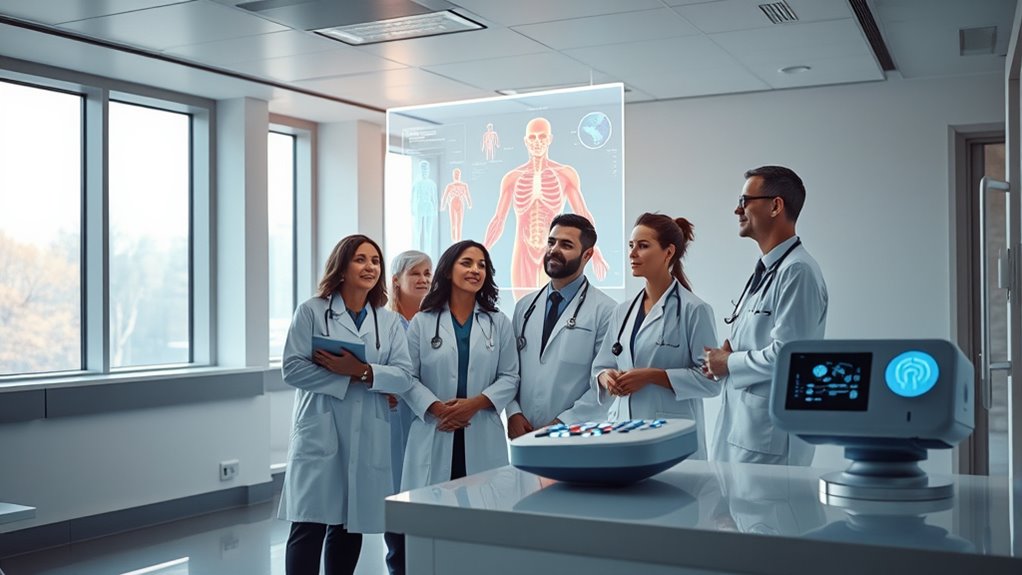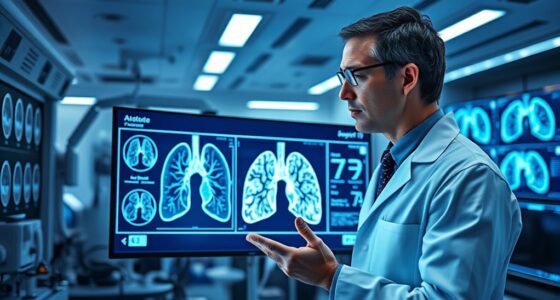AI tools are transforming healthcare by enhancing your capabilities and streamlining workflows without replacing you. These technologies support predictive analytics, optimize patient outcomes, and handle tasks like documentation and real-time transcription. They help reduce burnout, improve accuracy, and allow more time for patient care. As adoption accelerates, you’ll see AI empowering healthcare professionals more than ever. To discover how this revolution is shaping your future in medicine, keep exploring the latest innovations.
Key Takeaways
- AI tools assist clinicians with predictive analytics, clinical documentation, and real-time transcription, enhancing their efficiency and decision-making.
- Ambient listening AI captures clinical interactions to support accurate documentation without replacing healthcare professionals.
- AI-driven insights reduce workload, improve patient outcomes, and enable early interventions, empowering doctors rather than substituting them.
- Adoption of AI emphasizes augmenting human expertise, ensuring that healthcare professionals remain central to patient care.
- Ethical considerations and ongoing evaluation ensure AI enhances healthcare equitably, complementing rather than replacing medical staff.

Healthcare AI tools are transforming the way medical professionals deliver care and manage operations. By 2025, 86% of healthcare organizations are using AI extensively, showing how quickly these technologies are becoming part of everyday clinical and administrative tasks. The global healthcare AI market is expected to surpass $120 billion by 2028, reflecting strong commercial growth and increasing investment in AI-driven solutions. Predictive analytics, in particular, is widely adopted, with about 65% of U.S. hospitals using these tools to forecast patient outcomes, optimize resource allocation, and improve overall efficiency. Most hospitals—around 79%—depend on EHR vendor-embedded AI models rather than developing custom solutions, ensuring easier integration into existing workflows. The adoption rate of healthcare AI tools is accelerating rapidly, driven by technological advancements and proven benefits. One of the most impactful AI applications is in clinical documentation. Ambient listening AI tools are gaining popularity because they can capture and transcribe patient-provider interactions in real time. This reduces clinicians’ multitasking burden and improves documentation accuracy, which supports billing and coding processes. These tools are considered low risk and easier to adopt, making them an accessible entry point into healthcare AI. Since the rise of ChatGPT, adoption of ambient listening solutions has accelerated, moving quickly from early adopters to the pragmatic majority. Clinicians report significant efficiency gains and reduced burnout, making these tools valuable in busy clinical settings. Predictive analytics also plays a pivotal role in patient care. AI models help identify high-risk patients, predict inpatient trajectories, and optimize scheduling. These insights have contributed to up to a 50% reduction in hospital readmissions and a 30% decrease in unnecessary tests and procedures, saving costs and improving patient outcomes. Nearly 70% of providers use predictive analytics for early intervention and preventive care, and investments in this area are expected to grow at about 24% annually through 2030. Additionally, addressing bias, accuracy, and fairness in AI deployment is crucial to ensuring equitable healthcare outcomes. However, challenges remain. Less than half of hospitals evaluate AI models for bias, risking disparities in care. Better-funded institutions develop and evaluate models in-house, while under-resourced hospitals rely on external solutions, raising concerns about equity. Addressing bias, accuracy, and fairness in AI deployment requires regulatory oversight, policy support, and ongoing ethical considerations. As AI tools continue to enhance clinical practice, they do so to empower, not replace, healthcare professionals in delivering better patient care.
Frequently Asked Questions
How Do AI Tools Impact Patient-Doctor Relationships?
AI tools can both help and hinder your relationship with your doctor. They may free up time for more empathetic conversations, but often, technology creates a feeling of distance, making interactions seem impersonal. Trust is crucial, and if AI isn’t transparent, it could erode it. While AI can reduce administrative burdens, it’s essential that you and your doctor prioritize personal contact and shared decision-making to maintain a strong bond.
What Are the Ethical Considerations of AI in Healthcare?
You must prioritize privacy, fairness, transparency, and responsibility when integrating AI into healthcare. Guarantee data security by implementing strict protocols and informing patients about data use. Address biases by using diverse datasets and continuously evaluating algorithms. Promote transparency through clear explanations of AI decisions and uphold accountability with proper oversight. By doing so, you foster trust, uphold ethical standards, and deliver equitable care that respects patient rights and promotes professional integrity.
How Is Data Privacy Maintained With AI Integration?
You maintain data privacy in AI integration by following strict regulations like HIPAA and GDPR, ensuring patient data is encrypted and anonymized. You implement regular audits and monitor access to prevent breaches. Transparency and informed consent are key, so patients know how their data is used and can opt out if they wish. Additionally, you collaborate with stakeholders to develop ethical guidelines and stay updated on emerging privacy challenges.
Can AI Assist in Diagnosing Rare Diseases?
Absolutely, AI can assist in diagnosing rare diseases. It analyzes complex data from medical images, genetic tests, and health records to detect subtle patterns that might escape human eyes. AI tools quickly synthesize clinical information, helping you identify rare conditions faster. This reduces diagnostic delays, minimizes misdiagnoses, and supports earlier interventions, ultimately improving patient outcomes. By integrating seamlessly into your workflow, AI empowers you with precise, timely insights for complex cases.
What Training Is Needed for Doctors to Use AI Tools Effectively?
You need to hit the ground running by gaining foundational knowledge of AI concepts like machine learning and natural language processing. You should familiarize yourself with healthcare data structures and understand AI’s clinical applications. Hands-on experience with AI tools, critical appraisal skills, and collaboration with tech teams are essential. Plus, staying updated through courses, certifications, and professional communities helps you keep pace and avoid flying blind.
Conclusion
You can see how AI tools are transforming healthcare, not replacing doctors but empowering them like never before. These innovations are revolutionizing patient care, making diagnostics faster and treatments more precise. Far from a threat, AI is your trusted ally in the fight for healthier lives. Embrace this wave of change—it’s not just a step forward, but a leap into a future where medicine reaches heights once thought impossible. Together, you and AI can change the world of healthcare forever.











